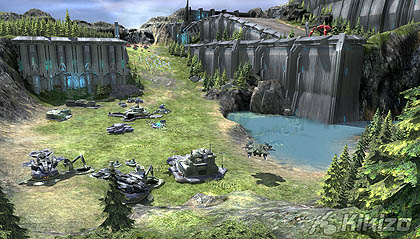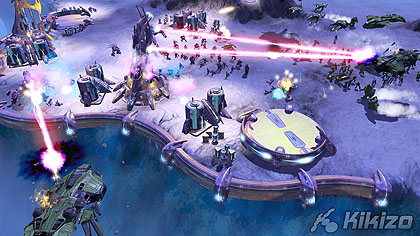Halo Wars
Ensemble's last stand goes under our microscope.
| Version 360 | Developer Ensemble | Publisher Microsoft | Genre RTS |
||||
Page 3
The well-padded tutorials make all this second nature, and the normal difficulty setting is laid-back enough to render the few control hang-ups unnoticeable. Missions range from solid examples of the old "hoard, build, defend, annihilate" formula to juicier set-pieces that force you to pick your research options and army make-up carefully. At one point you're asked to take down a part-constructed Super Scarab before it blasts through the ruins shielding your base, sending out divergent parties of Warthogs to distract it while you hunt for the power nodes supplying the beast. A later engagement takes place on the Flood-infested hull of the Spirit of Fire itself, periodically swept by a Forerunner decontamination beam: the latter will scour away any damaged Flood colonies in its path, but it'll also deep-fry any troops you leave out of doors.
These bursts of imaginative level design notwithstanding, you won't get at the grist of Halo Wars in the campaign alone. Compared to the resourcefulness, ingenuity and flat-out nastiness of a determined human opponent, the AI's swipes at your battle line are merely playful, and the presence of a whole new faction with rather wackier strengths and weaknesses is, of course, enticing.
On average, the Covenant forces are cheaper than their UNSC equivalents but slightly less capable in the fray. The initial unit cap is also higher. While this suggests that swarming is the extraterrestrial ne'er-do-well's tactic of choice, the Covenant also play a mean defensive game (at the cost of building slots) thanks to their forcefield generators. Base construction is handled much as for the UNSC, and there are broadly the same relationships between units, so you won't be completely out of your depth once you make the leap to competitive play.
Multiplayer and skirmish modes also let you pick one of the campaign characters as your Leader, each endowed with a personal Leadership power, economic boost and special unit. Anders can refit her homely Hornet fighters as Hawk super-fighters, while Cutter can dunk a pod-full of ODST marines anywhere on the battlefield. The Arbiter, Prophet of Regret and Brute Chieftan who make up the Covenant cast get their own, rather wackier bags of tricks, but more importantly they also appear on the battlefield as controllable units, buff enough to outface all but the Spartans. Reinforcements can also be warped directly to a Covenant leader's side via the teleport pads which spawn alongside their bases - a nasty surprise indeed when the other player thinks the worst is past.
Stir all this in with some sensible multiplayer-specific touches, like gifting resources to allies and having their cameras marked on your mini-map, and you've got a tremendously fun experience located somewhere between the phased progression of a round of Civilization Revolution and the pacey excess of a Command and Conquer - classic Age, in short. Ensemble fumbles the implementation at times: path-finding can be a serious issue when allied armies meet, obliging you to jostle individual units till your force disentangles itself.
As enjoyable as its first console project can be, we can't shake the feeling that the developer's best may have been yet to come. Cut down in its prime by the money-men, Ensemble leaves us with only an inkling of what it might have achieved a little further outside its PC RTS comfort zone: concept art for a Pixar-esque platformer, talk of a Diablo-in-space-style RPG, the skeleton of a Halo MMO. Rather than the pinnacle of a celebrated but sequestered history in one genre, Halo Wars could have been the first tentative footprint on virgin territory. Hopefully Robot Entertainment, the phoenix from Ensemble's ashes, will deliver on some of that promise. In the meantime, we suggest you honour this fallen giant with your wallets.
| ||||||||||||
|











 Satoru Iwata Video Interview - the late Nintendo president spoke with Kikizo in 2004 as 'Nintendo Revolution' loomed.
Satoru Iwata Video Interview - the late Nintendo president spoke with Kikizo in 2004 as 'Nintendo Revolution' loomed. Kaz Hirai Video Interview - the first of Kikizo's interviews with the man who went on to become global head of Sony.
Kaz Hirai Video Interview - the first of Kikizo's interviews with the man who went on to become global head of Sony. Ed Fries Video Interview - one of Xbox's founders discusses an epic journey from Excel to Xbox.
Ed Fries Video Interview - one of Xbox's founders discusses an epic journey from Excel to Xbox. Yu Suzuki, the Kikizo Interview - we spend time with one of gaming's most revered creators.
Yu Suzuki, the Kikizo Interview - we spend time with one of gaming's most revered creators. Tetris - The Making of an Icon: Alexey Pajitnov and Henk Rogers reveal the fascinating story behind Tetris
Tetris - The Making of an Icon: Alexey Pajitnov and Henk Rogers reveal the fascinating story behind Tetris Rare founders, Chris and Tim Stamper - their only interview? Genuinely 'rare' sit down with founders of the legendary studio.
Rare founders, Chris and Tim Stamper - their only interview? Genuinely 'rare' sit down with founders of the legendary studio. The History of First-Person Shooters - a retrospective, from Maze War to Modern Warfare
The History of First-Person Shooters - a retrospective, from Maze War to Modern Warfare